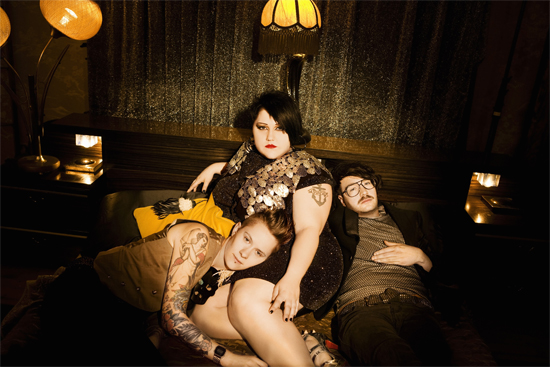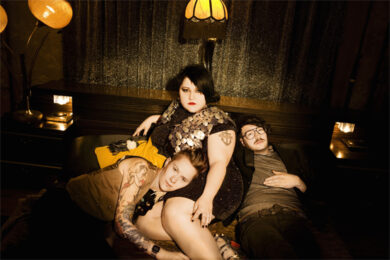It was never entirely clear, on encounters with The Gossip at queer nights like Homocrime in the early years of this decade, where exactly they might go. There was something defiantly pop about their dance imperative disco punk; about Beth Ditto’s between song banter; about the sheer quality of their songs (The Gossip wrote bangers long before ‘That Hit’) that suggested a mainstream potential. Alright, so their albums were frustratingly patchy affairs, but the Gossip have always been a live and singles outfit, as befits their punk roots. But they arguably fall between camps, too sexy for the indie realm, too soulful for punk, too abrasive for the mass market. Of course, with a judicious track placement on Skins (which, as The Quietus will discover, was entirely unwanted) the band suddenly became the inescapable hype band, nude on the cover of NME and snapped with Kate Moss in the tabloids. Watching from the outside point of view of the long-term fan it was hard not to worry, not through any qualms about their selling out – a pathetic concept of concern only to dribbling bedroom boys – but concern that a group of Americans from the radical Pacific North West scene wouldn’t understand the rapacious nature of the British press and music industry, and might allow it to destroy them, or put them off doing what they do so well. Yet on the evidence of new album Music For Men, such fears are unfounded. Rick Rubin might have hooked up with the three piece to add some superb 80s-influenced sass and panache, but a half hour chat with guitarist Nathan leaves The Quietus with the feeling that, whatever happens, they are set to continue just doing what they’ve always done, playing the bangers, making kids dance, and keeping on preaching their gospel.
So, Nathan, how have you been?
We’ve been working on the record, doing record stuff at home. I’m living in Portland still. Portland keeps you level headed because it’s so small, but I am kind of bored with it.
Has it been important to stay grounded?
Yeah I think so. It’s been really crazy on this tour, kind of like bigger than it’s ever been, and it was already weird. So there’s lots of press, lots of photos, it’s kind of full on now.
It’s never got too much and stopped the Gossip being fun?
Not really, sometimes we’ll have a weird random interviewer who goes ‘you’re a bunch of sell-outs, you’re friends with Kate Moss’, trying to be the devil’s advocate, and it’s kind of annoying because it’s like, well, did you listen to the record? Do you want to talk about music or do you want to sit here and… you just try to ignore those times. Playing shows is still fun, and we all get along really really well, so as long as that lasts.
There always was a huge mainstream potential, and interesting ideas that ought to be taken into the mainstream. Is there a Trojan horse element to what you’re doing?
I think so. The reason that we signed to a major label was because we kind of felt like we’d taken it as far as we could go with Kill Rock Stars. For us it’s important to have some effect on kids. The whole Nirvana thing was so important to us, some kid could read an interview and hear us talking about No Wave records or weird punk records, and learn from that. And that’s exciting, opening kids up to politics and music.
Do you have a mission to do that?
Yeah definitely. We try to do things interestingly as much as we can, take bands we like on tour, talk about good records, make interesting things, say no to stuff we don’t like. We try to reign it in as much as possible. Being on a major label there’s always a lot more offers than there was on an indie, but I guess that’s just more things to turn down.
What happened with you being on Skins then?
That was done without our permission, by the way. Back Yard gave it to them without asking us, which was ridiculous. We didn’t even know what the show was, then someone was like ‘oh you’re the theme songs for Skins‘ and we YouTubed it and were like ‘what the fuck?’ It was really random.
So Music For Men, there’s a lot more electronic music on there, was that reflected in your listening as you were writing it?
I was listening to lots of DAF, stuff like that. I realised one day that a lot of my music has keyboards in it, stuff like the Screamers, more aggressive pop. Keyboards with live drums, and play them like you play a bass.
Was that a learning process?
Definitely, because I still don’t know how to play piano, or a guitar even, so it took a while. Mostly what I did was found sounds I liked and worked with those.
How did Rick Rubin’s involvement come about?
He saw us play in LA and was just really in love with it. He said ‘oh my God you guys are such a modern punk band’. He really wanted to just work with it, and he approached us, so that was kind of nice.
It was all a good experience?
It was amazing, I can’t imagine working with anyone else now. He was so cool. He just did everything we said, he liked everything we did. He said it was one of his favourite records he’d ever worked on. We all got on so well.
We recorded in Malibu, at a place called the Shang Ri La. It was this really killer studio. They had Bob Dylan’s old tour bus parked in the back lot, and I loaded all my stuff in there and that’s where I demoed everything. I don’t like Bob Dylan, but the space was cool. Maybe I killed his soul?
How does the writing dynamic work now?
Beth likes me have full reign, she trusts me and my tastes and what I was doing. Hannah did her drum tracks in a week, and I stuck around for a month and a half just building and building on her drum tracks. I’d be emailing Beth tracks, and we went on from there. It felt like a true collaboration.
So you don’t have any fears about Sony, and staying level-headed as time goes on?
I always think about bands as entities, and who they are and the way they act. I don’t know if that’s because I’m obsessive, or if most people do that, but I generally think that when a band is becoming successful you wonder if they’re nice people, I think you’re pretty in control, except you’re not in control of what the media is going to say which is why you have to ignore it, but I think you can be in control of what the world sees of you if you make it a point to act cool and be conscious of what’s happening.
How much of that is because you’re from the South?
Probably a lot. In the South, you’re told to be humble all the time. Beth and I were raised to be humble and honest. I think that we’re pretty equal about how we feel about everyone. I think modesty and humbleness are really important, especially in this industry, and especially when you’re on a major label.



